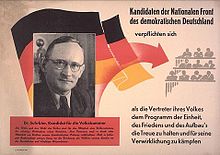- National Front (East Germany)
-
The National Front of the German Democratic Republic (German: Nationale Front der Deutschen Demokratischen Republik, NF, until 1973: German: Nationale Front des Demokratischen Deutschlands) was an alliance (Popular Front) of political parties and mass organisations in East Germany (also known as a Blockpartei). The NF was controlled by the Socialist Unity Party of Germany and was formed to stand in elections to the East German parliament, the Volkskammer ("People's Chamber").
It consisted of the following parties:
- Socialist Unity Party of Germany (Sozialistische Einheitspartei Deutschlands: SED) - now Die Linke
- Christian Democratic Union (Christlich-Demokratische Union: CDU) - incorporated into Western CDU
- Liberal Democratic Party of Germany (Liberaldemokratische Partei Deutschlands: LDPD) - incorporated into FDP
- Democratic Farmers' Party of Germany (Demokratische Bauernpartei Deutschlands: DBD) - incorporated into CDU
- National Democratic Party of Germany (Nationaldemokratische Partei Deutschlands: NDPD) - incorporated into FDP
and various mass organisations such as:
- Free German Trade Union Federation (FDGB) - dissolved
- Free German Youth (FDJ) - shares headquarters with Die Linke
- Democratic Women's League of Germany (Demokratischer Frauenbund Deutschlands: DFD) - now dfb
- Cultural Association of the DDR- continues as Kulturbund e.V.
Contents
History
The National Front was the successor to the Demokratischer Block which had been founded in the Soviet occupation zone. The Front itself was founded on March 30, 1950. It operated through the issuing of a generally consistent proportion of seats (divided between the Front's parties and SED-controlled mass organisations) submitted in the form of a single list of candidates during each election to the People's Chamber and based on a set quota rather than vote totals.[1] As the Front's list was the only one submitted it "won" with virtually unanimous levels of support.[2]
In 1950-1951, the public rejection of the validity of the list by some German politicians resulted in prison penalties for "rejecting the electoral law of the German Democratic Republic" (as in the case of LDPD leader Günther Stempel).
On December 5, 1989, the Front was effectively rendered impotent when the Christian Democratic Union and Liberal Democratic Party withdrew from it. On December 16 the ruling Socialist Unity Party was reformed into the Party of Democratic Socialism and distanced itself from prior SED policies. On February 20, 1990, an amendment to the Constitution of East Germany removed mention of the Front.[3]
Chairmen of the National Front
- Prof. Erich Correns (1950-1981)
- Prof. Lothar Kolditz (1981-1989)
Membership (4 parties altogether)
- 1977 365,000
- 1987 469,000
See also
- Politics of East Germany
- List of Volkskammer members (9th election period)
- United Front (PRC) for a currently running system similar to the National Front of the DDR.
References
- ^ Eugene Register-Guard October 29, 1989. p. 5A.
- ^ Kurt Sontheimer & Wilhelm Bleek. The Government and Politics of East Germany. New York: St. Martin's Press. 1975. p. 66.
- ^ Peter E. Quint. The Imperfect Union: Constitutional Structures of German Unification. Princeton, N.J.: Princeton University Press. 1997. p. 37.
External links
Categories:- Politics of East Germany
- Political parties in East Germany
- Popular fronts
- German political party stubs
Wikimedia Foundation. 2010.


